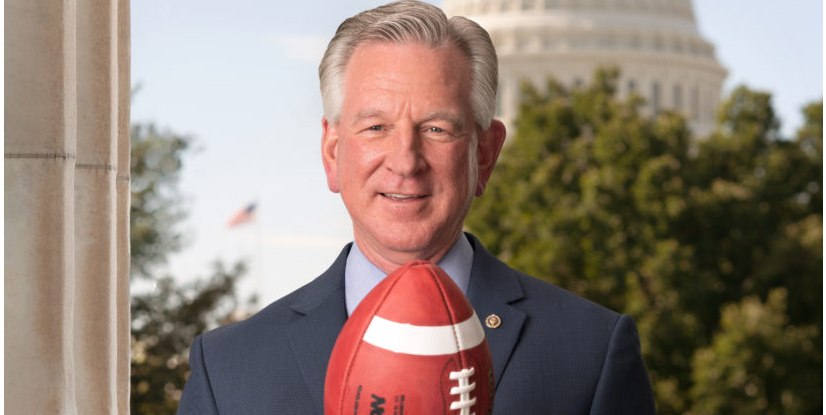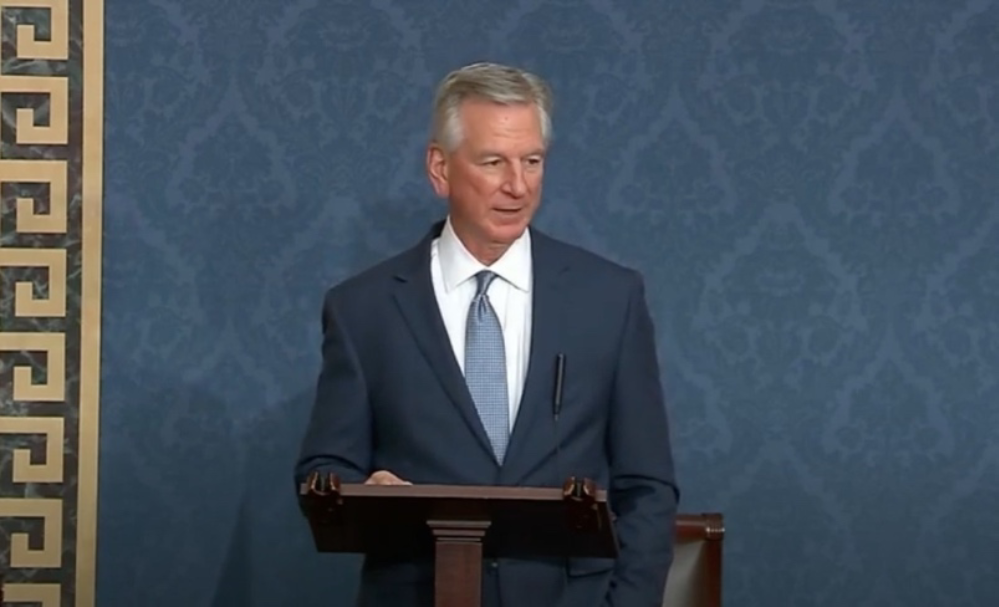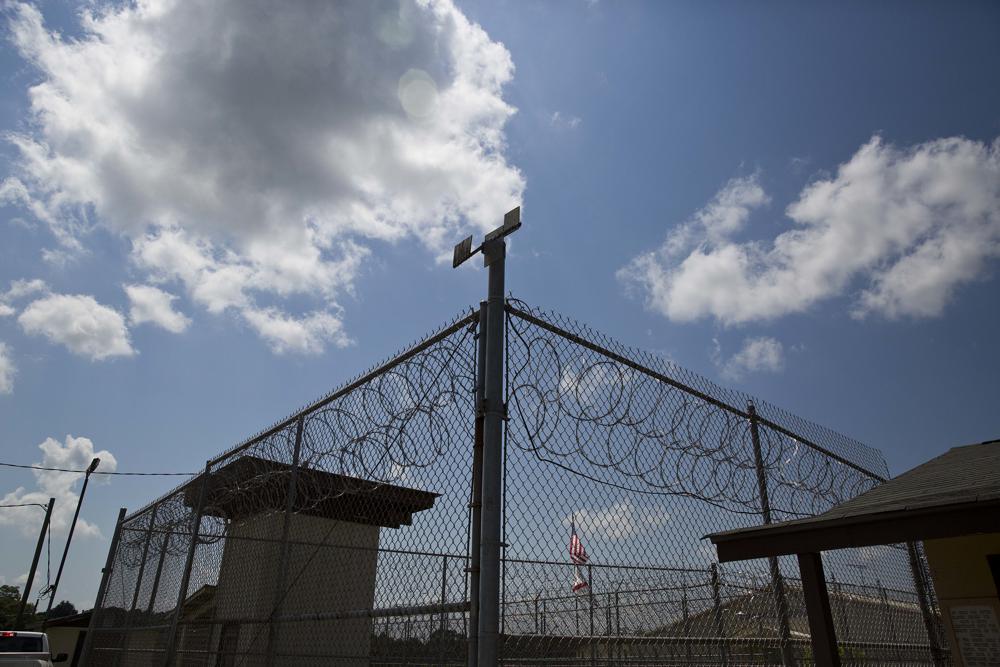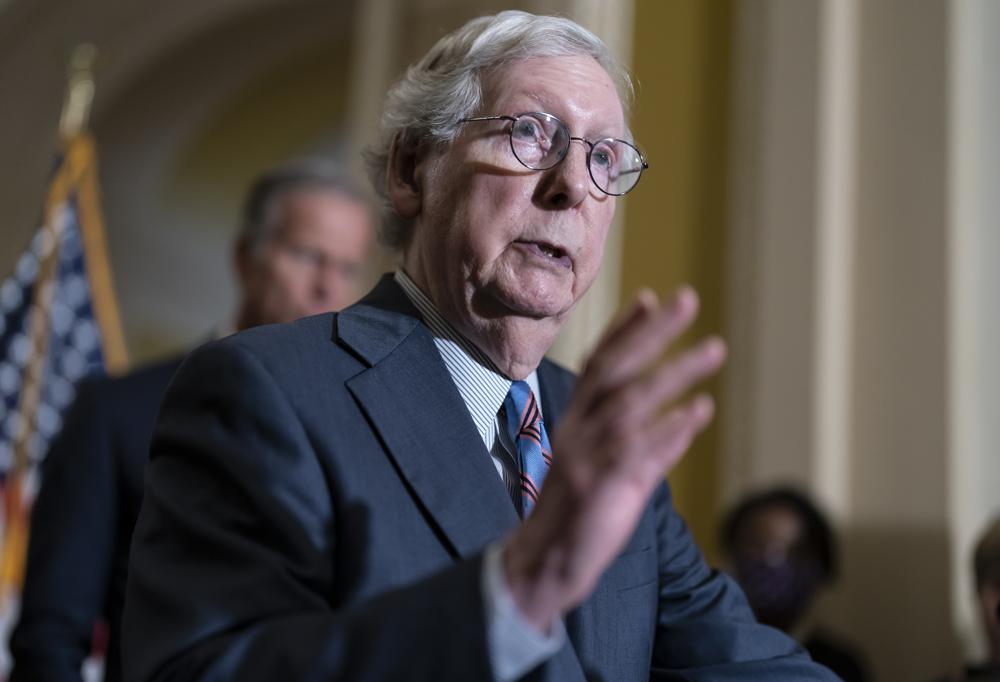Tommy Tuberville praises Hoover’s National Computer Forensics Institute

U.S. Senator Tommy Tuberville praised Hoover’s National Computer Forensics Institute (NCFI) in a speech on the floor of the Senate, highlighting the importance of the NCFI and its impact on officers and public safety. Tuberville helped pass the reauthorization bill to support the NCFI, where law enforcement officers come to Alabama from across the country to receive cybercrime training. The Senate passed bipartisan legislation, the National Computer Forensics Institute Reauthorization Act, which reauthorizes the operation of the Alabama-based NCFI. The bill also approves resources for federal officers to attend the law enforcement training center, which has previously only been available for local and state officials. Sens. Tuberville and Richard Shelby (R-Alabama) cosponsored the legislation along with Sens. John Cornyn (R-Texas), Chuck Grassley (R-Iowa), Dianne Feinstein (D-California), Maggie Hassan (D-New Hampshire), Amy Klobuchar (D-Minnesota), and Sheldon Whitehouse (D-Rhode Island). “Cybercriminals can hack pipelines and other key infrastructure systems that are crucial to our daily lives and pertains to our national security,” Sen. Tuberville said. “Officials trained at NCFI are a part of our front line of defense against these attacks. That front line — our local police officers, district attorneys, and state officials — know the people they serve best. I want those protecting my home and my state trained to identify and combat the latest threats — and I’m sure you do as well.” “Earlier this year, after a madman terrorized shoppers at a grocery store in Buffalo, New York, NCFI-trained graduates were able to act quickly and support the police response,” Tuberville continued. “They used what they learned to conduct a forensic exam of a Go-Pro camera and a cell phone used by the shooter. That crucial video evidence is currently being used in the prosecution.” “Brave men and women in law enforcement across the country are willing and able to protect Americans from all crime, including cybercrime, but they need the tools and resources to continue to do so effectively,” Tuberville added. “While some in Congress and the current administration have worked to shrink the size and strength of our law enforcement, I am unapologetic with my support for the men and women in blue. We must continue to provide specialized resources that all of them need to do their jobs. That’s why I joined a group of colleagues from both sides of the aisle to introduce the National Computer Forensics Institute Reauthorization Act.” “The National Computer Forensics Institute is an example of a state’s ingenuity and foresight — a group of individuals identifying a gap that needed to be filled and providing a service with national benefits,” Tuberville explained. “The success of the Institute represents the impact state leaders, and Congress can have on the entire country when we work together to support innovative and pragmatic solutions to our biggest problems. Alabama is proud of the National Computer Forensics Institute, and we’re proud to provide cutting-edge training to many Americans and our brave law enforcement.” In 2006, the Alabama Office of Prosecution Services and the Alabama District Attorneys Association saw the need for a more coordinated effort to train law enforcement officers, prosecutors, and judges in digital evidence. Those agencies outlined a plan to bring that training to more of our law enforcement officials — and formed a unique and important partnership with the U.S. Secret Service to create a center for forensics education for state and local law enforcement officials. NCFI opened in 2008 under a roof provided by the City of Hoover. The NCFI opened with a $4 million budget and just 264 students. The 40,000 square-foot NCFI facility now taps into a $13 million annual budget to train more than 4,000 students from across the country annually. To date, more than 19,000 state and local officers, prosecutors, and judges representing all 50 states have been trained at the institute in the heart of Alabama. The NCFI focuses on teaching officials how to investigate cyber and electronic crime — always accounting for emerging tech and novel digital capabilities — to prepare graduates to combat cyber-attacks and personal data theft. The skills learned at the NCFI also prepare law enforcement officers to identify and utilize key digital data during criminal investigations. The reauthorization will allow the NCFI to keep training thousands of officers a year in Alabama to keep communities across the country safe. Graduates have reported utilizing their training in more than 578,000 digital forensics exams. The NCFI seeks to educate state, local, tribal, and territorial law enforcement officers, prosecutors, and judges in the continually evolving cyber and electronic crime-related threats, and educate, train, and equip them with the tools necessary for forensic examinations to combat those crimes. Sen. Tuberville was elected to his first term in the Senate in 2020 after a career in football coaching. To connect with the author of this story, or to comment, email brandonmreporter@gmail.com.
“We need to do better,” Yolanda Flowers says of Alabama’s criminal justice system

On Monday, inmates at the Alabama Department of Corrections (ADOC) launched a statewide work stoppage to protest their quality-of-life concerns in Alabama’s prisons. On Wednesday, Alabama Democratic Party gubernatorial nominee Yolanda Rochelle Flowers said in a videotaped statement sent to Alabama Today, “We can do better.” Flowers claimed that the prisoners were being treated “worse than animals” and called on people to call Alabama Governor Kay Ivey to address her concerns. “Hey, this is Yolanda Flowers. I am your gubernatorial candidate for Governor of Alabama,” Flowers said. “My concerns that I want to address is our criminal justice system and how unfair it is all across the state.” “Our incarcerated loved ones, our incarcerated citizens, are suffering,” Flowers claimed. “They are suffering from the injustices. They are not getting the proper food. They are not getting the proper healthcare services. Whether it is mental or physical…they are not getting it. They are living in conditions that, to be honest, are worse than animals outside. We need to do better. We need to call our governor up on this. No, she doesn’t want to give equitability to our people, but our people are suffering. Yes, they made some mistakes, but that is OK; she has too. So I am asking that you all will vote for Yolanda Flowers.” The Alabama prison system has been heavily criticized over the years. The Southern Poverty Law Center (SPLC), on behalf of several current and former inmates, has sued the state claiming that the prisoners do not get the proper mental services and that the prisons are chronically understaffed. Federal Judge Myron Thompson has ordered the state to address the lack of mental health services. ADOC has responded by contracting with a new mental healthcare provider. Thompson has also ordered ADOC to hire 2,000 more prison guards. Despite raising the pay and providing generous signing and retention bonuses, ADOC has not been able to hire even 20 percent of that number in the past three years. That case is still pending. The Obama Justice Department ordered an investigation of the Alabama prison system. An investigation that the Trump Justice Department carried out. The DOJ investigation revealed that ADOC is the country’s most violent prison system and that numerous documented cases of beatings, rapes, and even murders of inmates by other inmates in the system. The system is awash in illegal drugs, and several inmates have overdosed while in ADOC custody. After the Ivey administration failed to move quickly enough to address DOJ’s concerns, then-Attorney General William Barr filed suit against the state, claiming that conditions in the Alabama prisons are so bad that they constitute a “cruel and unusual punishment” and are thus unconstitutional – a claim that the state of Alabama disputes. The Biden DOJ has not backed away from the Trump administration’s position and offered leniency to the state. In November, the Alabama Legislature approved Gov. Ivey’s plan to build two new mega prisons that will house in excess of 4,000 inmates each. The Ivey administration claims that the new facilities will allow ADOC to guard the same number of inmates with fewer guards while providing better health and mental services to inmates. Construction is underway on the two mega prisons in Elmore and Escambia Counties. In December, Gov. Ivey fired ADOC Commissioner Jeff Dunn, a Bentley Administration holdover who had been tasked with transforming the prison system. A video of an inmate being beaten by an ADOC guard on the roof of one of the prisons has only enflamed passions on both sides of the standoff. The inmates claim that ADOC is retaliating against their work stoppage by withholding food. Ivey and Flowers, along with Libertarian Dr. James “Jimmy” Blake, will be on the November 8 general election ballot for governor. To connect with the author of this story, or to comment, email brandonmreporter@gmail.com.
Kay Ivey awards $1.64 million to enhance trails

On Thursday, Governor Kay Ivey announced awards of nearly $1.64 million to improve outdoor recreational venues in Alabama. Funds from the federal Recreational Trails Program will be used to build, restore and improve trails in eight communities across the state. “Alabama’s outdoor trails are an excellent invitation for individuals, groups, and families to get outside and enjoy our state’s natural beauty,” stated Ivey. “I am proud to award these funds and create more opportunities for Alabamians and visitors to enjoy outdoor recreation in our beautiful state.” The funds were made available by the Federal Highway Administration’s Recreational Trails Program. The Alabama Department of Economic and Community Affairs (ADECA) administers the awards. “Trails and recreational facilities add so much to the quality of life in Alabama communities,” said ADECA Director Kenneth Boswell. “Seeing a well-kept and well-used trail or other recreational facility relays to everyone that this is a community that takes pride in itself and its people. ADECA is pleased to join Governor Ivey in supporting these trail projects.” Gov. Ivey awarded grants to: · Brundidge has received a $200,000 grant to resurface with asphalt and extend the trail at Ramage Park and expand the parking area. · The Calhoun County Commission was awarded $300,000 to construct a trailhead campsite with water, sewer, and electric hookups at the former Fort McClellan Army base in Anniston. The site offers about 20 miles of trails for hiking and horseback riding. · Cleveland will receive $90,148 to construct a walking trail, new gate, and benches at the Cleveland Family Recreation and Wildlife Habitat area. The project will include building a boardwalk across a pond. · The Colbert County Commission was awarded $244,952 to expand the Alloys Park campground by adding 17 campsites with hookups, a parking area and sidewalks. The campground is located at the Wilson Lake compound of the Tennessee River. · The City of Cullman received a $300,000 grant to construct a partially lighted motorized trail for golf carts at Palomino RV Resort at Burrow-Hamilton Farm. The 170-acre park is located off Cullman County Road 222 west of Interstate 65. It offers recreational vehicles and other campers opportunities to fish, paddle, swim, play pickleball and basketball, and more. · The City of Fayette was awarded $210,000 to construct a ¼-mile-long, 10-foot-wide multi-use trail downtown along an abandoned railroad bed as part of the first phase of the 2.2-mile-long project. The trail will extend from the Fayette Railroad Depot to Martin Luther King Jr. Boulevard. · Opelika has been awarded $210,000 to construct a multi-use trail along the banks of Pepperell Branch off Waverly Parkway and U.S. Highway 280. · Slocomb will receive an $88,032 grant to construct a 1.75-mile walking and bicycling trail and a parking area south of McCullough Road. The Recreational Trails Program (RTP) was created in 1998 and is funded by the U.S. Department of Transportation and the Federal Highway Administration. The RTP provides grant assistance to state and federal agencies and local governments for the acquisition and/or development/improvement of recreational trails and trail-related resources. Examples of eligible trail types include; but are not limited to walking, jogging, cycling, skating, mountain biking, hiking, backpacking, off-highway vehicle, and equestrian. The Federal share of the program is up to 80 percent of total project costs up to the grant ceiling associated with the type of trail and/or trail-related facility. The project sponsor must provide at least 20 percent match in the form of state, local, or private sources, and may include volunteer labor and/or donated materials and/or services. ADECA administers a wide range of programs that support law enforcement, victim assistance programs, economic development, water resource management, energy conservation, and recreation. To connect with the author of this story, or to comment, email brandonmreporter@gmail.com.
Tommy Tuberville votes against bill to keep the government funded; Richard Shelby votes in favor

The U.S. Senate passed a continuing resolution on Thursday that keeps the government funded through December 16—avoiding an election-year partial government shutdown. Senator Tommy Tuberville voted against the C.R. due to the spending increases that were added to the deficit. “A continuing resolution is meant to maintain government funding at its current level until Congress passes appropriation bills,” Tuberville said in an email to Alabama Today. “But, in what has become standard practice this Congress, Democrats were set on using this legislation to spend as much unrelated money as possible, as quickly as possible. This is a reckless approach to governing. Hastily spending billions of new dollars by attaching them to a continuing resolution is an irresponsible use of taxpayer funds.” Tuberville and 24 other Republicans opposed the C.R., but 22 Republicans voted with all of the Democrats in favor of the bipartisan legislation, so it passed the Senate 72 to 25. Sen. Richard Shelby voted in favor of the bill. Shelby is the Vice Chairman of the Senate Appropriations Committee. “The Senate has passed a Continuing Resolution ensuring the government will remain open and functioning,” Shelby said in a statement. Now, with very little time remaining, we must complete the full-year appropriations bills. My colleagues must quickly accept a bipartisan framework that rejects poison pills, maintains important legacy riders, and demonstrates a serious commitment to our national defense. We need to finish the job.” Sen. Patrick Leahy chairs the Appropriations Committee – which is tasked with passing C.R.s and actual budgets. “Before I begin, I want to acknowledge that this morning, countless Floridians woke up to a world turned upside down in the wake of Hurricane Ian,” Leahy said in a statement. “And hundreds of thousands in Puerto Rico remain without power more than ten days after the storm that ravaged the island. Vermonters will stand by your side as you rebuild your communities and your lives, and so will this chamber.” “The continuing resolution we are about to consider contains $18.8 billion for the FEMA Disaster Relief Fund, which would bring available resources in the fund to approximately $35 billion to respond to these and other disasters,” Leahy continued. “We likely will not know the extent of the damage for several days, but we are the United States of America, and I am ready to work with my colleagues to respond with what is needed.” “That said, I am glad that we have reached agreement to fund the federal government through December 16, and I want to thank my friend Vice Chairman Shelby and Leaders (Chuck) Schumer and (Mitch) McConnell for their work and cooperation in reaching this point,” Leahy added. “I am glad that we were able to secure $1 billion to bolster LIHEAP ahead of the winter heating season. In my home state of Vermont, which will receive an infusion of $5.7 million from this funding, this program goes a long way in helping families pay their bills when faced with rising fuel costs and plummeting temperatures.” “The bill also includes $12.35 billion dollars in emergency assistance for Ukraine; $2.5 billion to support recovery efforts following the Hermit’s Peak/Calf Canyon Fire in New Mexico; and $2 billion in Community Development Block Grants to help communities recovering from major disasters in 2021 and 2022,” Leahy stated. “I am disappointed that due to Republican opposition, there is no additional funding to combat COVID-19 or Monkeypox, but I will keep fighting for these important resources. Finally, I want to be clear. This is only a temporary measure,” Leahy continued. “As the Chairman of the Appropriations Committee, I am committed to completing the work of the Committee before the end of this Congress. Running on autopilot after December with rising inflation would be irresponsible. It would leave priorities – of both Republicans and Democrats – underfunded and under-resourced. The federal government funds programs that the American people rely on, and we should do the job they sent us here to do. I want to thank Vice Chairman Shelby’s staff. I also want to thank my staff for their hard work and countless hours. Charles Kieffer, Chanda Betourney, there are too many to name now, so I ask unanimous consent that their names be entered into the Record. This continuing resolution is a strong bill. It is a bipartisan bill, and I urge my colleagues to support it.” The bill will now advance to the House of Representatives, where it is expected to pass. Following House passage, the bill will be sent to President Joe Biden’s desk for his signature, which is anticipated. The U.S. national debt is $30.9 trillion. To connect with the author of this story, or to comment, email brandonmreporter@gmail.com.
Alabama legislator Chris Pringle takes aim at charter school funding proposal

An Alabama state lawmaker offered sharp criticism for the state’s charter school programs as he cast a vote on a spending proposal at a recent meeting. State Rep. Chris Pringle, R-Mobile, is one of nine members on the Alabama Joint Contract Review Committee. At a recent meeting, Pringle bemoaned a $119,995 spending request from state education officials for a study of charter schools. It was part of a package of contracts for various public and private schools. In his comments to state staffers, Pringle said he was displeased with the performance of Alabama’s charters. “I know you all are having a lot of problems where you’re putting these charter schools,” Pringle said. “I mean, everybody in Washington County told you they didn’t want that school. It’s half-built now, and its never going to open. And I know you all have a disaster down in Houston County.” According to the Alabama Policy Institute, there are 11 charter schools operating in the state. Five more are scheduled to come online this school year, Emma Gibney, Policy Communications Manager for the Institute, told The Center Square in an exclusive interview. Of the 11 charter schools, one public school has converted to a charter school, Gibney said. The spending request, which the committee unanimously approved, is for the onboarding of a consultant: Georgia-based Cognia Inc. According to state documents, a description of the spending request states it will serve the Alabama Charter School Commission for quality school reviews. The 13-month Cognia contract, which began September 1 and runs through September 30, 2023, calls for the evaluation of six charter schools “to include site visits and post visit reports.” “A rubric will be developed to evaluate the progress of the charter schools,” the request states. When asked to justify the spending proposal, state education authorities in a statement wrote, “The services require a team with expertise in charter school evaluations based on the specifics of each charter school contract.” Pringle, who was asked if he wanted to hold the spending request and declined to do so, did continue to question the proposal even as it advanced. “We’re spending a lot of money to analyze stuff, but after you all have made a bad decision, what good does it do to analyze it?” Pringle said. “It seems like you need to analyze it on the front end.” Doubling down on his criticism of the state’s Charter School Commission, Pringle said, “They’re making terrible decisions over there, and it’s costing the taxpayers money. These are awful decisions, but apparently, you aren’t willing to address your decisions before you make them.” The charter school contract was one of 18 spending requests under the Education Department that the Alabama Joint Contract Review Committee took up at their most recent meeting. The other requests – which included a learning hub for STEM education and various programs benefiting special education students – were approved without comment. Republished with the permission of The Center Square.
Steve Marshall joins 20 Attorneys General calling for U.S. Supreme Court to uphold immigration law

Arizona Attorney General Mark Brnovich is leading a group of 21 attorneys general in an amicus brief regarding federal immigration law. The attorneys general are asking the Supreme Court of the United States to uphold a federal statute to enforce federal immigration law in United States v. Hansen. “In the middle of this man-made disaster at our southern border, we need every tool and law available,” Arizona Attorney General Brnovich said in a press release. “The last thing we need is anyone incentivizing migrants to come here illegally and further straining our social safety net. Border communities are being overwhelmed by the influx of people.” A grand jury charged California resident Helaman Hansen with multiple crimes in 2017 for scamming hundreds of noncitizens out of more than $1 million by promising them a nonexistent path to citizenship. According to the release, Hansen was charged under a federal statute for encouraging people to come to the United States illegally for “commercial advantage or private financial gain,” according to the release. The Ninth Circuit Court of Appeals then struck down the statute arguing that the words “encourage” and “induce,” in the law are too broad. General Brnovich and the attorneys general argue in their amicus brief that the Ninth Circuit decision jeopardizes the constitutionality of criminal law in all 50 states. They worry that the decision may cause other state and federal courts to invalidate existing criminal laws. The other attorneys general who signed the brief is from the states of Alabama, Arkansas, Connecticut, Florida, Georgia, Indiana, Kansas, Kentucky, Louisiana, Mississippi, Missouri, Montana, Ohio, Oklahoma, South Carolina, South Dakota, Tennessee, Texas, Utah, Virginia, and Wyoming. Republished with the permission of The Center Square.
Alabama prisons reduce meals, nix visits amid inmate strike

Thousands of inmates in Alabama’s overcrowded prison system are receiving only two meals a day during a prisoner work stoppage that was in its fourth day Thursday, and the agency said weekend visitation also was being canceled. While inmates and activists have accused the Department of Corrections of using pressure tactics in an attempt to end the demonstration, officials said the reduced rations and the lack of visits were the result of a prisoner labor shortage. Inmates provide much of the labor force inside prisons, the department said, so the lockups eliminated one of the three meals that normally are served to compensate for the lack of workers. “This is not a retaliatory measure but logistically necessary to ensure that other critical services are being provided,” the department said in a statement. Photos posted on social media showed brown bag meals consisting of a corn dog or peanut butter sandwich. The prison system said it would return to regular meal service once the strike ends, but it wasn’t clear how long that might take. The department said most of its large male prisons were still affected by the strike on Thursday, and visitation was being canceled this weekend because of the stoppages and their impact on prison staff. “Inmates have been notified and encouraged to notify any visitors,” the agency said. Activist Diyawn Caldwell, whose husband is incarcerated in Alabama, said canceling visitation was “just another mechanism for retaliation” by the state on inmates. She said prison officials also are threatening striking inmates with loss of living space in honor dorms, where conditions often are better than in other areas. “That’s huge in there because you’re taking merits they have earned away from them because they don’t want to perform free labor,” said Caldwell, who founded Both Sides of the Wall, which describes itself as a grassroots organization. Gov. Kay Ivey has rejected demands for criminal justice reforms, including changes to sentencing laws for habitual offenders, calling them unreasonable. Alabama prisons held more than 20,000 inmates in July, when the Department of Corrections issued its latest statistical report, despite being designed for only 12,115 people. The department runs 13 major prisons for men, the largest of which holds more than 2,200 men, and one for women. The Department of Justice is suing Alabama over the conditions in its prisons, saying the state is failing to protect male inmates from inmate-on-inmate violence and excessive force at the hands of prison staff. The 2020 lawsuit alleges that conditions in the prison system are so poor that they violate the constitutional ban on cruel and unusual punishment and that state officials are “deliberately indifferent” to the problems. Alabama officials have acknowledged problems but deny that the living conditions violate constitutional standards. Republished with the permission of The Associated Press.
Senate passes stopgap bill to avert shutdown, aid Ukraine

The Senate passed a short-term spending bill on Thursday that would avert a partial government shutdown when the current fiscal year ends at midnight Friday and provide another infusion of military and economic aid to Ukraine as it seeks to repel Russia’s brutal invasion. The bill finances the federal government through December 16 and buys lawmakers more time to agree on legislation setting spending levels for the 2023 fiscal year. It passed by a vote of 72-25 and now goes to the House for consideration. All of the no votes came from Republicans. As has become routine, lawmakers waited until the final hours before the shutdown deadline to act. But passage of a bill to fund the government was hardly in doubt, particularly after Democrat Sen. Joe Manchin agreed to drop provisions designed to streamline the permitting process for energy projects and greenlight the approval of a pipeline in his home state of West Virginia. Those provisions had drawn opposition from both sides of the political aisle. Still, the bill merely puts off for a few months the maneuvering that will be required after the midterm election to pass a massive government funding package, as negotiators will have to bridge their differences over spending on hot-button issues such as abortion, border security, and climate change. The bill approved Thursday, with some exceptions, keeps spending at federal agencies at current levels through mid-December. The most notable of those exceptions is the more than $12 billion that will be provided to aid Ukraine, on top of more than $50 billion provided in two previous bills. The money will go to provide training, equipment, and logistics support for the Ukraine military, help Ukraine’s government provide basic services to its citizens, and replenish U.S. weapons systems and munitions. “Seven months since the conflict began, it’s crystal clear that American assistance has gone a long way to helping the Ukrainian people resist (Russian President Vladimir) Putin’s evil, vicious aggression,” said Senate Majority Leader Chuck Schumer, D-N.Y. “But the fight is far from over.” Republican leader Mitch McConnell also voiced support for the Ukraine aid, while admonishing the Biden administration to get it out the door more quickly. “Assisting Ukraine is not some feel-good, symbolic gesture,” McConnell said. “It’s literally an investment in our own national security and that of our allies.” Disaster assistance was attached to the stopgap bill, including $2.5 billion to help New Mexico communities recover from the Hermit’s Peak/Calf Canyon Fire, the largest wildfire in the state’s history; $2 billion for a block grant program that aids the economic recovery of communities impacted by recent disasters and $20 million for water and wastewater infrastructure improvements previously authorized for Jackson, Mississippi. An additional $18.8 billion was included for the Federal Emergency Management Agency to respond to current and future disasters, such as Hurricane Ian, which hit Florida on Wednesday. The bill would provide an additional $1 billion for a program that helps low-income households heat their homes. And it would transfer $3 billion from a Pentagon aid program to the State Department for continued Afghan resettlement operations. Lawmakers also included a reauthorization of the Food and Drug Administration’s user fee agreements for five years, which ensures the agency can continue critical product safety reviews and won’t need to issue pink slips for thousands of employees working on drug and medical device applications. One thing missing from the bill is the billions of dollars in additional funding that President Joe Biden sought to aid the response to COVID-19 and monkeypox. Republicans criticized the health spending as unnecessary. The White House said the money would have been used to accelerate the research and development of vaccines and therapeutics, prepare for future COVID variants and support the global response. The bill’s passage is the last must-do item on lawmakers’ list before returning to their home states and districts to campaign before the mid-term elections that will determine which party controls the House and Senate over the next two years. Lawmakers were anxious to get out of Washington and focus on campaigning without the specter of a shutdown. “The last thing the American people need right now is a pointless government shutdown,” Schumer said. Republished with the permission of The Associated Press.


